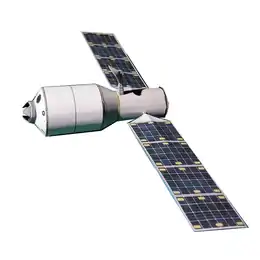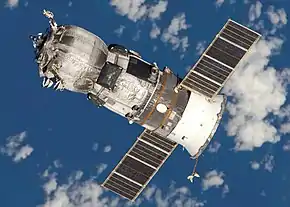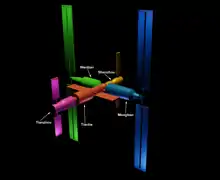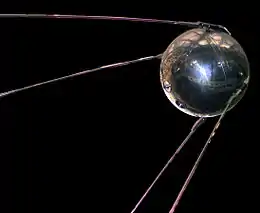Tianzhou (spacecraft)
The Tianzhou (Chinese: 天舟; pinyin: Tiān Zhōu; lit. 'Heavenly Ship') is a Chinese automated cargo spacecraft developed from China's first prototype space station Tiangong-1 to resupply its future modular space station. It was first launched (Tianzhou 1) on the Long March 7 rocket from Wenchang on April 20, 2017[1] and demonstrated autonomous propellant transfer (space refueling).[2][3]
 | |
| Country of origin | China |
|---|---|
| Operator | CNSA |
| Applications | Tiangong-2 resupply |
| Specifications | |
| Spacecraft type | Automated cargo spacecraft |
| Launch mass | Up to 13,500 kg (29,800 lb) |
| Payload capacity | Up to 6,500 kg (14,300 lb) |
| Dimensions | 9 m × 3.35 m (29.5 ft × 11.0 ft) |
| Volume | 15 m3 (530 cu ft) |
| Production | |
| Status | Active |
| Related spacecraft | |
| Derived from | Tiangong-1 |
The first version of Tianzhou has a mass of 12,910 kg and can carry 6,500 kg of cargo.
Function
Based on the Tiangong-1 space station, it is planned that the Tianzhou will function as the main automated cargo spacecraft for the Chinese space station. It will have pressurized, semi-pressurized and unpressurized cargo capabilities, and will be able to transport airtight cargo, large extravehicular payloads and experiment platforms. It was first launched on the new Long March 7 rocket from Wenchang on April 20, 2017.[2][4]
Name
The China Manned Space Engineering Office opened a consultation for the naming of the prospective cargo ship on April 25, 2011. By May 20, it had received more than 50,000 suggestions.[5] On July 8 Yang Liwei, China's first astronaut and deputy director of the Chinese Academy of Sciences revealed that they had a short list of ten names.[6] On October 31, 2013, it was revealed that they spacecraft had been named Tianzhou (Chinese: 天舟; pinyin: Tiān Zhōu; lit. 'Heavenly Boat'), a combining the Chinese names of the Tiangong (Chinese: 天宫; pinyin: Tiān Gōng) space stations and the Shenzhou (Chinese: 神舟; pinyin: Shén Zhōu) spacecraft. They also stated that they would use the two letter identification TZ.[7]
Missions
| No. | Spacecraft | S/N | Launch (UTC) | Carrier Rocket |
Launch Pad |
Docking | Deorbit | Remarks | ||
|---|---|---|---|---|---|---|---|---|---|---|
| Station/ Port |
Docking | Undocking | ||||||||
| 1 | Tianzhou 1 | Unknown | 20 April 2017 11:41 | Long March 7 | Wenchang LC-2 | Tiangong-2 Fore | April 21, 2017[8] | 22nd September 2017 08:15 UTC | 22nd September 2017 (deorbit burn at 10:00 UTC) | Maiden flight of the Tianzhou spacecraft. First Tianzhou flight to Tiangong-2. |
See also
- Comparison of space station cargo vehicles
- Progress spacecraft – an expendable cargo vehicle currently in use by the Russian Federal Space Agency
- Automated Transfer Vehicle – a retired expendable cargo vehicle used by the ESA
- Cygnus spacecraft – an expendable cargo vehicle developed by Northrop Grumman under American CRS program, currently in use.
- H-II Transfer Vehicle – an expendable cargo vehicle currently in use by JAXA
- Dream Chaser Cargo System - a cargo variant of the reusable SNC's spaceplane
- Dragon cargo spacecraft - a reusable cargo vehicle developed by SpaceX, under American CRS program, currently in use.
References
- Barbosa, Rui C. (25 June 2016). "China successfully debuts Long March 7 rocket". NASASpaceflight.com.
- Ping, Wu (June 2016). "China Manned Space Programme: Its Achievements and Future Developments" (PDF). China Manned Space Agency. Retrieved 2016-06-28.
- Clark, Stephen (17 September 2017). "Chinese space station freighter concludes refueling demo mission". Spaceflight Now. Retrieved 5 May 2018.
- Barbosa, Rui C. (19 April 2017). "Tianzhou-1 – China launches and docks debut cargo resupply". NASASpaceFlight.com. Retrieved 5 May 2018.
- "中国货运飞船征名超5万个" [Chinese cargo ship over 50,000 new name] (in Chinese). China Network Television. 2011-05-20. Retrieved 2016-06-27.
- "中国货运飞船征名结束 龙舟等10个名字入选" [Chinese cargo ship sign name ends dragon boat 10 names selected] (in Chinese). 163.com. 2011-07-09. Retrieved 2016-06-27.
- "中国载人空间站命名"天宫"货运飞船为"天舟"" [China's manned space station cargo spacecraft to be named Tianzhou] (in Chinese). China News. 2013-10-31. Retrieved 2016-06-27.
- "China's Tianzhou 1 cargo carrier docks with space lab in orbit – Spaceflight Now".
External links
| Wikimedia Commons has media related to Tianzhou. |


